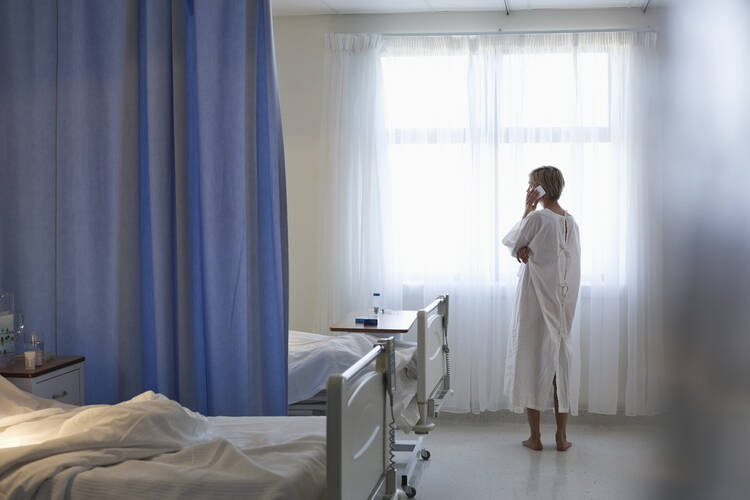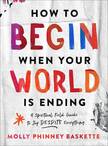Review: God doesn’t make us sick or well. So what is faith’s role in the face of illness?
When a friend of mine was diagnosed with metastatic breast cancer, instead of becoming tranquil and cheerfully focused on survival, her generally cranky personality became even crankier. The chief targets of her rage—other than the election of our former president in 2016 and the health care organization that wanted her to leave her home and enter a hospice—were the kinds of treacly and sentimental cards and “inspirational” books about illness and death that seem to proliferate in this country. Every time someone would send her one, she would thrust it in my or another friend’s direction, saying “get this out of my house right now.”
An entire industry has sprung up around making sickness and death palatable and even trendy, with “illness influencers” attracting hundreds of thousands of followers on social media and book publishers cranking out seemingly endless tomes turning sickness into a journey, a means of embracing life more fully, even an adventure. The reality is that potentially mortal illnesses and chronic ones are painful, ugly and terrifying. To face up to them with wry humor and a taste for the ironic takes a delicate touch, but that is what the United Church of Christ pastor and writer Molly Baskette does in her new book, How to Begin When Your World Is Ending.
An entire industry has sprung up around making sickness and death palatable and even trendy, with “illness influencers” attracting hundreds of thousands of followers on social media.
Just over a decade ago, at the age of 39, Baskette was diagnosed with a rare form of cancer. Her children were very young, and she was just beginning to transform the church where she was pastor from moribund and shrinking into thriving and growing. Baskette, raised by a parent with a major depressive disorder, had turned out to be a high-achieving woman, the kind of person who attends an Ivy League school not once, but twice. But her “brand” of strength and success, like that of many successful people confronted with illness and mortality, wouldn’t be enough on its own to vanquish her mortality.
In the face of cancer, she writes, “the workaholic self I had carefully constructed to make myself a valued and therefore indispensable person wherever I went found no purchase.”
Early in the book, Baskette mentions that every person in training for ministry takes a class in systematic theology in which they examine the “nature and being” of God along with concepts like sin, salvation, redemption and resurrection. The ultimate goal is to give ministers a “blueprint for a boat of sorts,” an understanding of God’s presence that will survive the travails of working up close with human suffering. By opening the door to what her own suffering was like in the face of illness, Baskette’s book also allows readers to experience what it is like to be a Christian minister who works with human suffering as she experiences her own suffering.
In The Wounded Healer, Henri Nouwen wrote that “for a compassionate person, nothing human is alien.” Baskette walks the reader through her own medical transformation from healthy and long-haired to bald and frail, trying to explain what is happening to her small children, celebrating small milestones like throwing a “peach fuzz party” with bellinis when her hair begins to grow back. In a broken world where stories like Baskette’s and those of the people she ministers to are all too common, she reminds us that “God doesn’t make the fractures, but God will make use of them.”
Baskette reminds us that “God doesn’t make the fractures, but God will make use of them.”
The risk in any story about a person moving through illness is that it will pivot into a feel-good tale of beating the odds and surviving—the kind of book my friend with cancer would have thrown across the room. Baskette avoids that by balancing her own survival story with those of parishioners she worked with who did not survive, and by being frank about the toll cancer took on her marriage, her children and the church she served.
Being a parent, for example, can sound like a lot of fun in Baskette’s accounting of it, though she will also admit it “will also take you to new levels of fury, disappointment, anxiety, and stone-cold terror.” Stories like her church congregation breaking out into dance or her family throwing a Covid-19 prom in their living room, and tales of “besties” who seem to proliferate in her life at times of crisis (which is not always the case for sick people) can risk being sentimental or cheesy. But just when the book threatens to tilt that way, Baskette will remind readers that for cancer survivors, “these are not happy endings. They are new growth after devastation.”
Throughout the book, Baskette is also more than willing to puncture some of the more banal Christian sentiments about suffering, from “God has a plan” to the notion that suffering is always redemptive. God’s role in suffering, she writes, is more complicated than that, because “faith requires both relinquishment of control and taking charge of the freedom God gives us that no circumstances can take away.” That is the blessing and curse of living in a human body.
Baskette is also frank about the challenges of life as a pastor, including leaving the church community that saw her through cancer only to land at a new church in Berkeley that caught fire soon after she arrived (full disclosure: I have spoken at Baskette’s church). This, too, could be a cheesy resurrection story, but Baskette is frank that deciding how to rebuild the church and the ensuing fights about what to do can be a challenge among Berkeley’s trenchant NIMBYs, as goodhearted as they might be. But even NIMBYs can provide opportunities for spiritual movement. “I don’t believe that God is responsible for disasters and cancer,” Baskette writes, “but that does not mean that our God is a safe God and won’t ruthlessly take any opportunity to break and enter our hearts.”
My friend died a few years ago, not because she wasn’t brave in the face of cancer, but because cancer is wily and determined to have its way. For anyone diagnosed with an illness or the people who care about them, Baskette’s book is a reminder that God doesn’t make us sick, and God doesn’t make us well. God is with us in the suffering, the rage—and even in the redemption. God is at the chemo infusion and the follow-up scans. And God is with us at the funeral, on the dance floor, at the five-year survival party and in our bodies, no matter how sick or well they may be.
This article also appeared in print, under the headline “Facing mortality head-on,” in the March 2023, issue.











